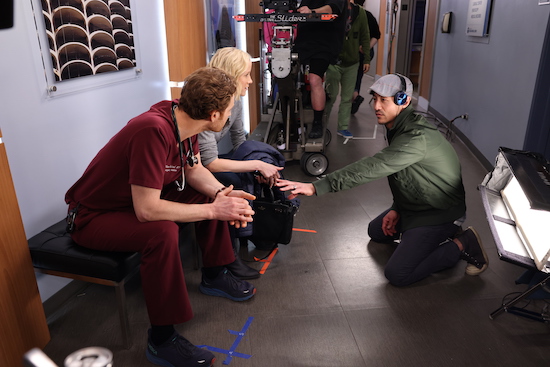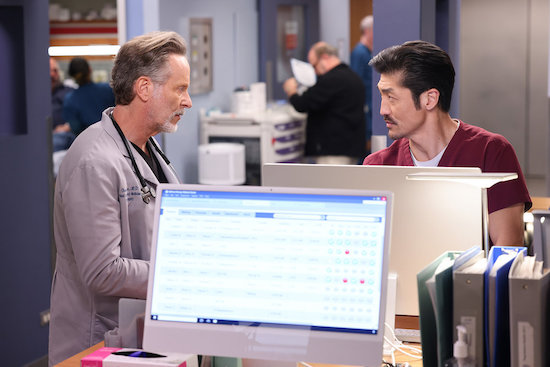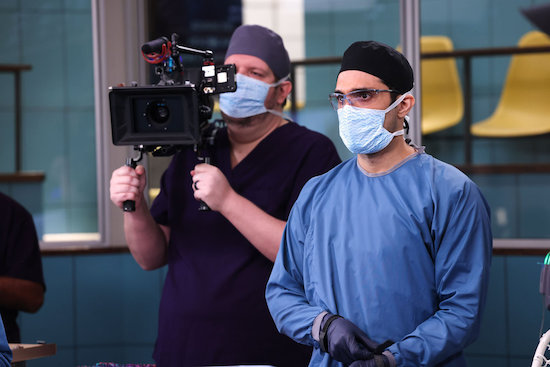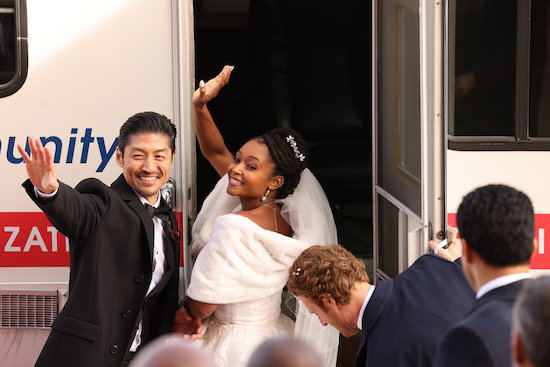CHICAGO MED: Brian Tee on Getting to Shake Up the Show’s Look for His Directorial Debut
March 28, 2023 by Marisa Roffman

CHICAGO MED — “Know When to Hold and Know When to Fold” Episode 817 — Pictured: (l-r) Nick Gehlfuss as Will Halstead, Jessy Schram as Hannah Asher, Brian Tee — (Photo by: George Burns Jr/NBC)
Brian Tee returns to CHICAGO MED with the Wednesday, March 29 hour, “Know When to Hold and Know When to Fold,” in a very different capacity: directing!
After playing doctor Ethan Choi for more than seven seasons (prior to his December exit), stepping behind the camera on CHICAGO MED was a natural evolution. Though this marks Tee’s network directorial debut, he had been prepping for the experience during his duration on the show, shadowing directors and learning about the post-production process.
“I think I used my time [on the show] wisely,” Tee tells Give Me My Remote. “People were incredibly gracious, both on and off set, to allow me to learn from them.”
Here, he talks about returning to MED in a different capacity, previews the unique directing style opportunities the hour brought him, and praises the “wonderful” way Ethan left the series.
When did your interest in directing start?
It’s actually been something that I’ve been circling, and aspiring to, for a very long time. First and foremost, I’m an actor, but I’m also a storyteller. And over the course of being in the industry, I’ve adapted to certain stories that I’ve been wanting to tell and have a particular voice that I’d love to kind of stretch. I think you have to start from somewhere, and fortunately for me, CHICAGO MED was where I got my roots in the sense of directing.
I think I used my time [on the show] wisely. People were incredibly gracious, both on and off set, to allow me to learn from them. And Michael Pressman, I shadowed him [when he was a directing producer on MED]. I even went and shadowed [former directing producer] Eriq La Salle on CHICAGO P.D. throughout my stint as an actor on CHICAGO MED. So from that, to jumping in [to observe] the post-production house, learning from [executive producer] Arthur Forney and his wonderful team of editors like David Siegel, I really got to be a part of the CHICAGO MED world, not just as an actor, but also a student of the craft.
So when I got the opportunity to ask for a directing job, it felt very in sequence with what I was striving for.
Looking specifically at your time shadowing Eriq, he’s a fellow actor-director. What did you learn from him that you were able to incorporate into your work so far?
I love Eriq. He’s an incredible human, filmmaker, and artist. Just watching him in his process, the greatest thing that I love about him, also, is with all of his talents, he always expresses the best idea wins. It’s not about ego. It’s not about anything. We’re making art. And we’re making this together. It’s a collaboration. So the best idea wins. And let’s just keep winning. I love that about Eriq.
I thought that was the most wonderful point of view to take, especially for me coming into a directing position. It’s, “Listen, this is all a team effort. Best idea wins. Let’s be egoless about it, and keep winning.”
View this post on Instagram
When it came time for you to actually prep for this hour, was there anything you were surprised to learn about the process or MED that you hadn’t experienced as “just” an actor?
It’s interesting—the process of being an actor and understanding the technicality of it all, if you’re paying attention, is ingrained in you as far as an actor’s perspective. You just kind of flip perspectives, and then load the way that you want to tell a particular story.
What I learned as far as sitting in the director’s chair, is that perspective [in that role] is everyone’s perspective—it’s not just yours. As an actor, you’re kind of focused on your character, your particular storyline. Of course [you think about] how it affects others, but in that sense, you really want to create and perform a particular arc.
As a director, you’re [thinking about] not just your character, but everyone else’s character. So in that sense, the amount of knowledge that you have to have, the amount of preparation that you need to put in, as far as being able to fulfill a particular storyline through the points of view of all of the characters, was something that I just had to learn. It was a learning curve, but I had a wonderful experience.
When you got this script, what element excited you the most?
I’m a fan of character development. I’m a fan of the change in particular characters and their journeys, even if it’s just in one particular episode. Or the extension of a journey, because I think we all change, and we all have to somehow evolve. I think that’s what keeps audiences coming back to particular shows: the evolution of character. Because if the character doesn’t evolve, then what’s really the point? I love scripts that have that particular evolution. In [“Know When to Hold and Know When to Fold”], we had a few instances where it was either a relationship struggle or a letting go of particular relationships. So I love those scenes; I was really excited about moving and progressing the show forward.

CHICAGO MED — “This Could Be The Start of Something New” Episode 809 — Pictured: (l-r) Steven Weber as Dean Archer, Brian Tee as Ethan Choi — (Photo by: George Burns Jr/NBC)
We’ve done a few interviews paired with Steven Weber before, and you seem to have a very light, fun friendship. In the episode, Weber’s Archer has a roller coaster arc as his kidney issues progress. What was it like directing him throughout those beats?
It is a much more serious storyline, but it was the same professionalism as if we were two actors, but yet with the same camaraderie as two friends—except now one of them is actually directing.
So I think in anything I think in any great relationship, and any great character situation…when you create this relationship of trust, that really kind of just creates everything else. It exponentially creates a relationship. It creates the believability of those two particular people together, both on- and off-camera. In creating that trust, coming in as a director, it was the same trust.
When you give over to that particular trust, when you have somebody new—as far as a new director—coming in, there’s this trust balance. And you almost have to earn it as a new director coming into a show. But for myself, the trust factor with me and Steven was already there. So me coming in as a director, we just kind of continued on with that trust as we’re working together. So it was the same.
How was it getting to direct your other former co-stars?
My relationship with my actors—as far as me being an actor on the show—is something that I hold in my heart, that I honor and respect; that I appreciate and value. And I have that same sentiment as a director. So having that trust between actors and then me just taking the director seat, that trust was still there. So as far as working with the actors and finessing performance or giving notes, that trust was there. So for us, the relationship was easy. For us, the work was easier, because that trust was there.

CHICAGO MED — “Know When to Hold and Know When to Fold” Episode 817 — Pictured: (l-r) Dominic Burgess as Michael Kennedy, Dominic Rains as Crockett Marcel — (Photo by: George Burns Jr/NBC)
In the episode, a documentary crew comes in to film a big surgery—and we get to see a bit of their footage. How was it getting to film in that style?
We did that a lot. I think I took advantage of that particular storyline. This allowed me to kind of break off from what you would normally see in a CHICAGO MED show and mine a different perspective of it. And you’ll see that in the particular directing style that I added to the documentary footage. I think it really allowed this different point of view, almost an audience’s perspective, that I really leaned into. So I think, and I hope, that the fans will be excited about it when they watch.
What was it like getting to create that look from scratch?
It was a lot of fun. I would say that the show stands on its own. You don’t deviate from it too much. I think you just add certain elements that hopefully elevate and it really boils down to the script. And if the script allows you to do that, then, yeah, it’s kind of a green light to be able to lean into it. I think it’s still a CHICAGO MED show.
I just think there’s just this added element that won’t necessarily change the entire show in its essence, but add a little more flavor. I was very fortunate to be able to have that as far as the script was concerned. Because had that storyline not been in there, I wouldn’t be able to break the fourth wall.
So much of CHICAGO MED is shot on the soundstages, on those hospital sets. Given the hundreds of hours you’ve spent on set, was there anything you were able to utilize as a director because you knew it so well?
I would say our episode is very contained. The very first scene is outside of the hospital, but the rest of the episode is fully encapsulated inside “our” hospital. We utilize, I feel, every portion of the hospital that a lot of audiences may or may not have seen. Meaning, a lot of the episodes are [normally] inside of the ED and treatment rooms. I feel like [in this one] we were in hallways, we’re in ICUs, we’re in post-ops. We’re in certain areas that normally in a CHICAGO MED show you’ll see a few times, but I was able to use almost all of it in our particular episode.
With this under your belt, what do you feel was your biggest lesson from this experience?
You know, I think the biggest lesson I learned is what I learned for myself. I think I didn’t realize I would enjoy it so much.
I come from a very sports-oriented background. I made this particular analogy that I felt at every take that it was a play, and I was a coach. All of my cast and crew were like my players, and each individual had a specific part. As soon as I would yell action, the play would be on, and then when I would yell cut, the play would be over. But those particular takes, sometimes they’re good and sometimes they’re bad. And you’ll see me literally cheerleading behind video village. It was like I’m on the sideline of some kind of football field or something. [In some takes,] focus was great, the performances were good. And some takes, you fumble. But I enjoyed that process so much.
When asked the question, “What is your directing style?”—I know that’s more from a visual perspective. But in house, as far as talking to certain directors, there’s a particular persona that people talk about. And I think I found mine in the sense of just enjoying the process. I found, I guess, that voice as a director, but also the enthusiasm of it all. And I think that enthusiasm breeds to the cast and crew. Because if the director is having fun, I think everyone else is allowed to as well. So in that sense, it’s one of the wonderful experiences that I had.
And moving forward, I would just try to relay that—give more to myself as far as the process is concerned. Enjoy it and, hopefully, that bleeds into the rest of the cast and crew on whichever show that I’m working on.

CHICAGO MED — “This Could Be The Start of Something New” Episode 809 — Pictured: (l-r) Brian Tee as Ethan Choi, Yaya DaCosta as April Sexton — (Photo by: George Burns Jr/NBC)
Ethan got his happily ever after in your final appearance as a regular. In your mind, where do you think he is now? And do you have any thoughts about whether we might see him again, on-screen, even if it’s just for a few minutes?
There’s an Easter egg in my episode of a glimpse of Ethan. I’ll just throw that out there.
But where’s Ethan now? I think he’s doing his thing, in an altruistic way. I feel like him and April are going around town and serving the underserved communities, serving those that need it the most. And I think that’s what’s wonderful about how they went out: They went out with those particular essences and they would continue to pursue them. I think they’re happy. I think if Ethan were ever to come back, it would be exciting for the fans and for myself. It would be fun to come back and play with my friends again.
CHICAGO MED, Wednesdays, 8/7c, NBC
RELATED:
- CHICAGO MED: ‘Know When to Hold and Know When to Fold’ Photos
- CHICAGO MED: ‘What You See Isn’t Always What You Get’ Photos
- CHICAGO MED: ‘Those Times You Have Crossed The Line’ Photos
- CHICAGO MED: ‘On Days Like Today… Silver Linings Become Lifelines’ Photos
- CHICAGO MED: ‘It’s an Ill Wind The Blows Nobody Good’ Photos
- CHICAGO MED: ‘We All Know What They Say About Assumptions’ Photos
- The CHICAGO MED Bosses Preview a Triangle (Or Quad?!) ‘of a Different Sort’ Between Dean-Hannah-Archer
- CHICAGO MED: ‘It Is What It Is, Until It Isn’t’ Photos
- CHICAGO MED: ‘A Little Change Might Do You Some Good’ Photos
- CHICAGO MED Post-Mortem: Andrew Schneider and Diane Frolov on the Chexton Wedding, the ED’s New Boss, and More to Come in 2023
- CHICAGO MED: ‘This Could Be The Start of Something New’ Photos
- CHICAGO MED: NBC Teases Brian Tee’s Final Episode
- CHICAGO MED Recap: Ethan Has a Surprise Announcement
- CHICAGO MED: ‘Everyone’s Fighting a Battle You Know Nothing About’ Photos
- CHICAGO MED: ‘The Clothes Make The Man…Or Do They?’ Photos
- CHICAGO MED: Asjha Cooper Exits
- CHICAGO MED: ‘Mama Said There Would Be Days Like This’ Photos
- CHICAGO MED’s Nick Gehlfuss and Jessy Schram on Will and Hannah’s Relationship: ‘It’s Still Unfolding’
- CHICAGO MED: ‘Yup, This is The World We Live In’ Photos
- CHICAGO MED: Brian Tee to Exit
- CHICAGO MED’s Steven Weber on Getting to Showcase the John Ritter Foundation in the Medical Drama
- CHICAGO MED: Diane Frolov and Andrew Schneider Preview the Hospital Grappling with Supply Chain Issues and (Shaky) New Residents
- CHICAGO MED: ‘Winning the Battle, but Still Losing the War’ Photos
- CHICAGO MED Premiere Shocker: One Doctor Exits, While a Former Regular Returns
- CHICAGO MED: What You Need to Know About the Season Premiere
- CHICAGO MED: Diane Frolov and Andrew Schneider Preview the Fallout from the Fiery Cliffhanger
- CHICAGO MED: ‘(Caught Between) The Wrecking Ball and The Butterfly’ Photos
- CHICAGO MED Season 8 Premiere: ‘How Do You Begin to Count the Losses’ Photos
- ONE CHICAGO: NBC Reveals New Posters for CHICAGO MED, CHICAGO FIRE, and CHICAGO P.D.
- CHICAGO MED: ‘And Now We Come To The End’ Photos
- CHICAGO MED Stars Brian Tee and Steven Weber Share One True and One Joke Finale Tease
- CHICAGO MED Post-Mortem: Brian Tee on Ethan’s Revelation and Blake’s Big Decision
- CHICAGO MED: ‘Lying Doesn’t Protect You From the Truth’ Photos
- CHICAGO MED: Brian Tee and Steven Weber on Ethan Giving Archer Control Over the ED, a Surprising New Case
- The CHICAGO MED Team Previews Ethan’s ‘Big Emotional Curveball’
- Daily Dose of Joy: ONE CHICAGO Stars Play Trivia for Charity
Follow @GiveMeMyRemote and @marisaroffman on Twitter for the latest TV news. Connect with other TV fans on GIVE ME MY REMOTE’s official Facebook page.
And be the first to see our exclusive videos by subscribing to our YouTube channel.
As an Amazon Associate we earn from qualifying purchases made through links/ads placed on the site.
Related Posts
Filed under Chicago Med
Comments Off on CHICAGO MED: Brian Tee on Getting to Shake Up the Show’s Look for His Directorial Debut



Comments